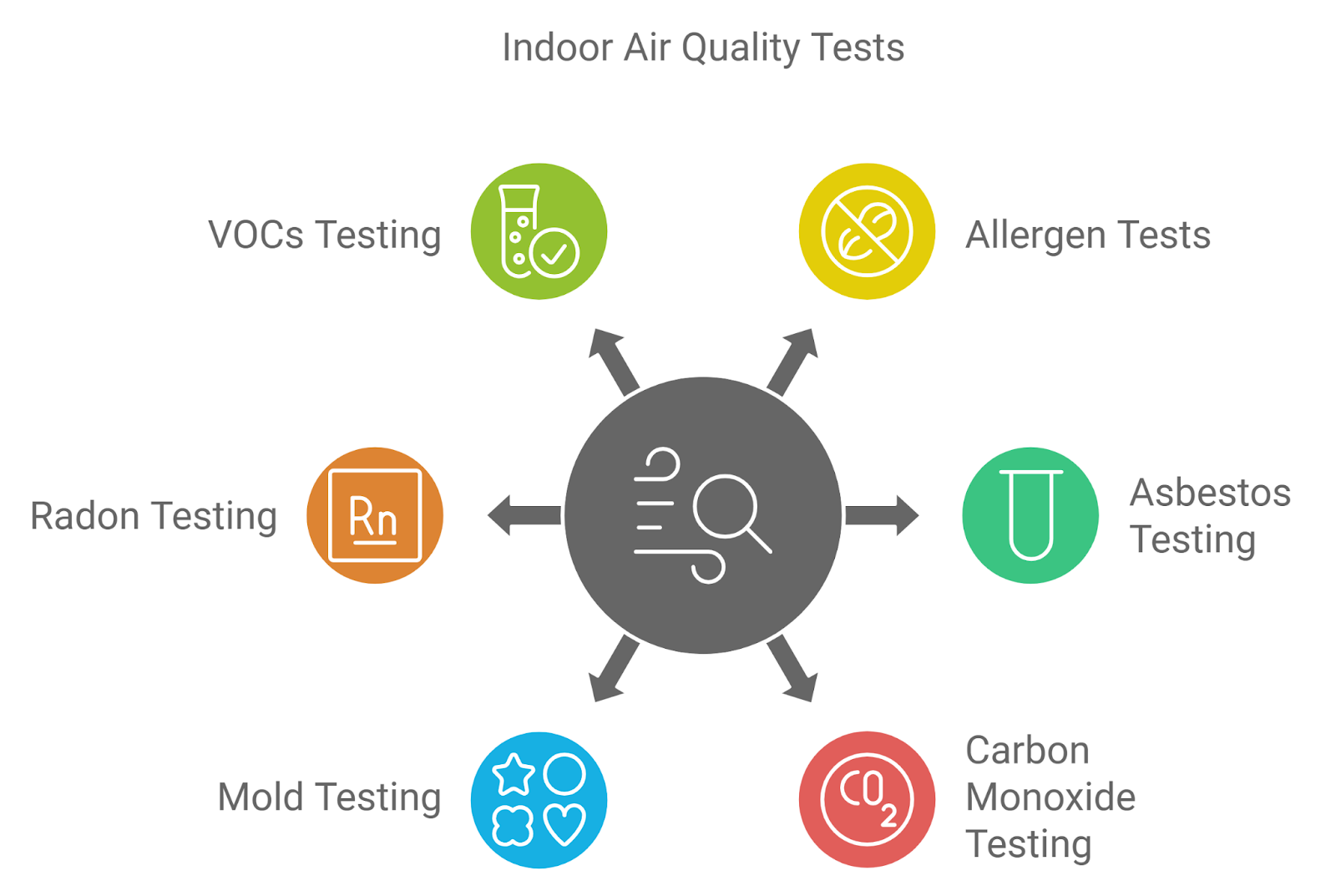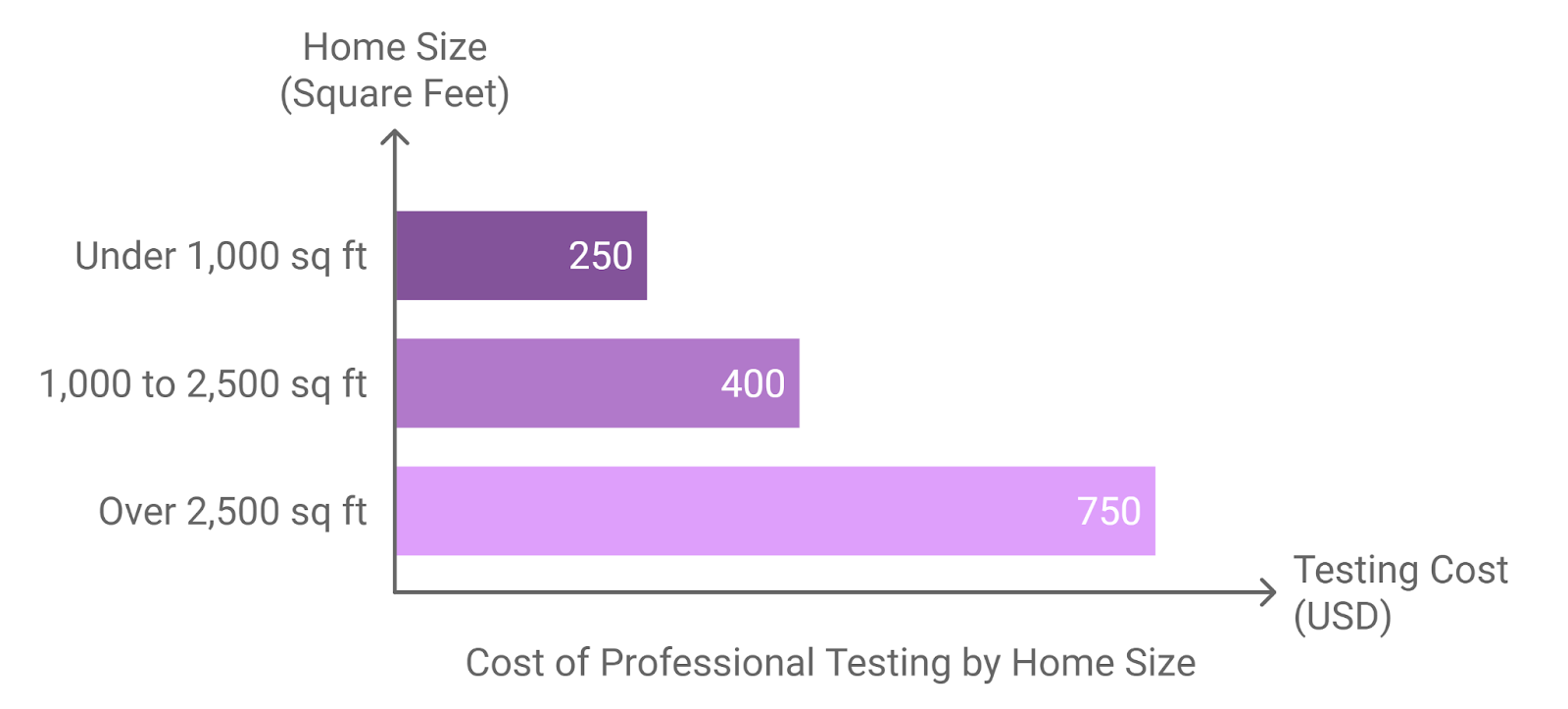Indoor air quality testing is an essential process for ensuring the safety and health of a home environment. Poor indoor air quality can lead to a variety of health issues, including respiratory problems, allergies, and other long-term health risks. For homeowners in St. Louis, where seasonal changes and urban living can contribute to air quality issues, regular testing is especially important. Whether it’s mold, radon, or volatile organic compounds (VOCs), understanding what’s in the air you breathe is crucial.
The cost of indoor air quality testing in St. Louis varies depending on several factors, such as the type of test, the size of the home, and the choice between a DIY kit or hiring professional services. While DIY kits are affordable and range from $100 to $500 for full analysis, professional services can average around $436, with prices typically falling between $290 and $582. However, Air Sense Environmental offers indoor air quality testing in St. Louis for just $100. These prices reflect a range of variables that we will explore in detail.
1. Factors Influencing the Cost of Indoor Air Quality Testing
Type of Test
One of the primary factors that affect the cost of indoor air quality testing is the specific type of test required. Indoor air contains many different types of pollutants, each requiring a different testing method. Some of the most common tests include:
Allergen Tests: Identifying common household allergens like dust, pet dander, and pollen typically costs between $75 and $100.
Asbestos Testing: Older homes, particularly those built before the 1980s, may contain asbestos, which can cost $100 to $125 to detect.
Carbon Monoxide (CO): This deadly gas, which can result from faulty heating systems, can be tested for around $40 to $50.
Mold Testing: Mold spores, particularly harmful to respiratory health, can be tested for $30 to $50.
Radon Testing: A significant concern in the Midwest, radon testing typically costs between $15 and $30.
Volatile Organic Compounds (VOCs): These chemicals are found in household products and building materials, with tests ranging from $100 to $150.

The more pollutants you choose to test for, the higher the overall cost. Homeowners concerned about multiple pollutants may require comprehensive testing, which can be more expensive.
Size of the Home
The size of your home also plays a critical role in determining the cost of air quality testing. Larger homes require more thorough testing, as the number of rooms and the volume of air space increase. Typically, professional services charge the following based on home size:
Homes under 1,000 square feet: $200 to $300.
Homes between 1,000 and 2,500 square feet: $300 to $500.
Homes over 2,500 square feet: $500 to $1,000.
For homeowners in St. Louis, it’s essential to consider the layout and square footage of the property when determining the potential costs.
DIY vs. Professional Services
When it comes to testing indoor air quality, homeowners have the option of choosing between DIY testing kits or hiring professional services. Each option has its pros and cons:
DIY Testing Kits: These kits are relatively affordable and allow homeowners to perform basic air quality checks. They are ideal for simple tests like checking for carbon monoxide, radon, or mold. Costs typically range from $100 to $500 depending on the comprehensiveness of the kit. DIY kits are a good choice for those who want a quick, preliminary analysis without spending too much.
Professional Testing Services: While more expensive, professional air quality testing offers a thorough and reliable assessment. Professionals use advanced equipment to measure various pollutants and provide detailed reports. On average, professional testing services cost around $436, but the peace of mind they offer especially for homes with children, elderly residents, or individuals with health concerns can be well worth the price. Professionals are often recommended for larger homes or when dealing with multiple or serious air quality concerns.
Ultimately, the choice between DIY and professional services depends on the complexity of the test needed and the homeowner’s comfort with interpreting the results.
2. DIY Indoor Air Quality Testing Kits
Overview of DIY Kit Costs
For homeowners looking to test their indoor air quality without breaking the bank, DIY kits offer an affordable and accessible solution. These kits are designed to allow individuals to perform basic air quality assessments at home, without the need for professional help. Depending on the type of pollutant being tested, the cost of DIY kits ranges from $100 to $500 for a comprehensive kit. This makes them a popular choice for those seeking quick and preliminary analysis of indoor air quality.
Breakdown of the Cost for Specific Pollutant Tests
DIY air quality testing kits come with a variety of options depending on the specific pollutants homeowners want to target. Here’s a breakdown of typical costs for each pollutant:
Allergens: Testing for allergens such as dust, pet dander, and pollen costs between $75 and $100.
Asbestos: Common in older homes, asbestos testing can be done for $100 to $125.
Carbon Monoxide (CO): To detect carbon monoxide, a potentially deadly gas, tests range from $40 to $50.
Mold: Mold testing kits, which can identify harmful spores, typically cost between $30 and $50.
Radon: In areas like St. Louis, where radon can be a concern, radon testing costs between $15 and $30.
Volatile Organic Compounds (VOCs): Found in household products and building materials, VOC testing ranges from $100 to $150.
Advantages and Disadvantages of Using DIY Kits
DIY air quality testing kits have their own set of pros and cons that homeowners should consider before making a purchase:
Advantages:
Cost-Effective: DIY kits are much cheaper than professional services, making them a budget-friendly option.
Convenient: They can be used at any time, giving homeowners flexibility.
Quick Results: DIY kits often provide faster results, especially for basic pollutants like radon and mold.
Disadvantages:
Limited Accuracy: DIY kits may not provide the same level of accuracy as professional testing, especially for complex pollutants.
Requires Interpretation: Homeowners must interpret the results themselves, which can be confusing or misleading without expertise.
Not Comprehensive: DIY kits may not cover all potential pollutants, leaving room for incomplete assessments.
When Homeowners Should Consider Using a DIY Kit
DIY kits are a good choice for homeowners who are looking for a preliminary check of indoor air quality, particularly if they have specific concerns like radon or mold. They are also ideal for those on a budget or those who want to quickly assess their home environment before committing to professional services. However, if the home has a history of air quality issues, or if the residents include children, elderly individuals, or those with respiratory problems, a more comprehensive professional test might be needed.
3. Professional Indoor Air Quality Testing Services
Average Cost of Professional Testing in St. Louis
For homeowners seeking a more thorough and reliable assessment, professional indoor air quality testing is the best option. In St. Louis, the average cost for professional testing is approximately $436, but it can vary depending on the size of the home and the complexity of the pollutants being tested. Unlike DIY kits, professional services provide a comprehensive analysis, backed by specialized equipment and expert interpretation of results.
Price Range Based on the Size of the Home
The cost of professional testing can vary significantly based on the size of the home. Larger homes require more testing points and a more detailed analysis, which increases the overall cost. Here’s a breakdown of the typical price range based on home size:
Under 1,000 square feet: $200 to $300.
1,000 to 2,500 square feet: $300 to $500.
Over 2,500 square feet: $500 to $1,000.

Additional Factors Influencing Cost
Several other factors can affect the cost of professional air quality testing. These include:
Complexity of the Pollutants: Homes with multiple pollutants, such as a combination of mold, radon, and VOCs, will require more extensive testing, which can raise the cost.
Age of the Home: Older homes, particularly those built before modern building codes, may require additional tests for asbestos or lead.
Testing Equipment: Professionals use advanced equipment for precise readings, which adds to the cost but ensures greater accuracy.
Benefits of Hiring Professionals for More Accurate and Comprehensive Results
There are several key advantages to hiring professionals for indoor air quality testing:
Highly Accurate Results: Professionals use specialized equipment to detect even trace amounts of pollutants, ensuring a more accurate and reliable assessment.
Comprehensive Testing: Unlike DIY kits, professional services can test for a wide range of pollutants simultaneously, providing a more thorough understanding of the home’s air quality.
Expert Interpretation: Professionals not only provide the results but also interpret them, offering insights and recommendations for improving air quality.
Health Benefits: For families with children, elderly members, or individuals with health concerns, professional testing can provide peace of mind and help prevent serious health issues related to poor air quality.
Professional services are the ideal choice for homeowners who want a complete understanding of their indoor air quality and are willing to invest in their home’s health and safety.
Conclusion
When it comes to indoor air quality testing, homeowners in St. Louis have two main options: DIY kits or professional services. DIY testing kits offer an affordable and convenient way to conduct basic air quality checks, with costs ranging from $100 to $500 depending on the pollutants tested. They are ideal for homeowners who are looking for a quick, preliminary analysis. However, DIY kits may lack the accuracy and comprehensive nature of professional testing.
On the other hand, professional testing services provide a thorough and reliable assessment, using advanced equipment to detect multiple pollutants. With an average cost of $436 in St. Louis, professional testing can range between $290 and $1,000, depending on the size of the home and the complexity of the pollutants tested. However, Air Sense Environmental offers professional indoor air quality testing in St. Louis for just $100, making it a highly cost-effective option. Professional services are especially recommended for larger homes, older properties, or households with known health concerns.
When deciding which option to choose, homeowners should weigh the costs against the benefits. While DIY kits are budget-friendly, they may not catch every issue, and interpreting results can be tricky. Professional testing, though more expensive, offers peace of mind with detailed reports and expert recommendations, ensuring that even the most hidden pollutants are detected and addressed.
Final Recommendation: Homeowners in St. Louis should consider indoor air quality testing if they have an older home, have experienced mold or water damage, or if anyone in the household suffers from respiratory issues or allergies. Whether opting for a DIY kit, hiring professionals, or choosing Air Sense Environmental's affordable option, investing in air quality testing is a proactive step toward ensuring a healthy, safe living environment for your family.

 SURVEY
How Did You Hear About Us?
SURVEY
How Did You Hear About Us?





























Comments